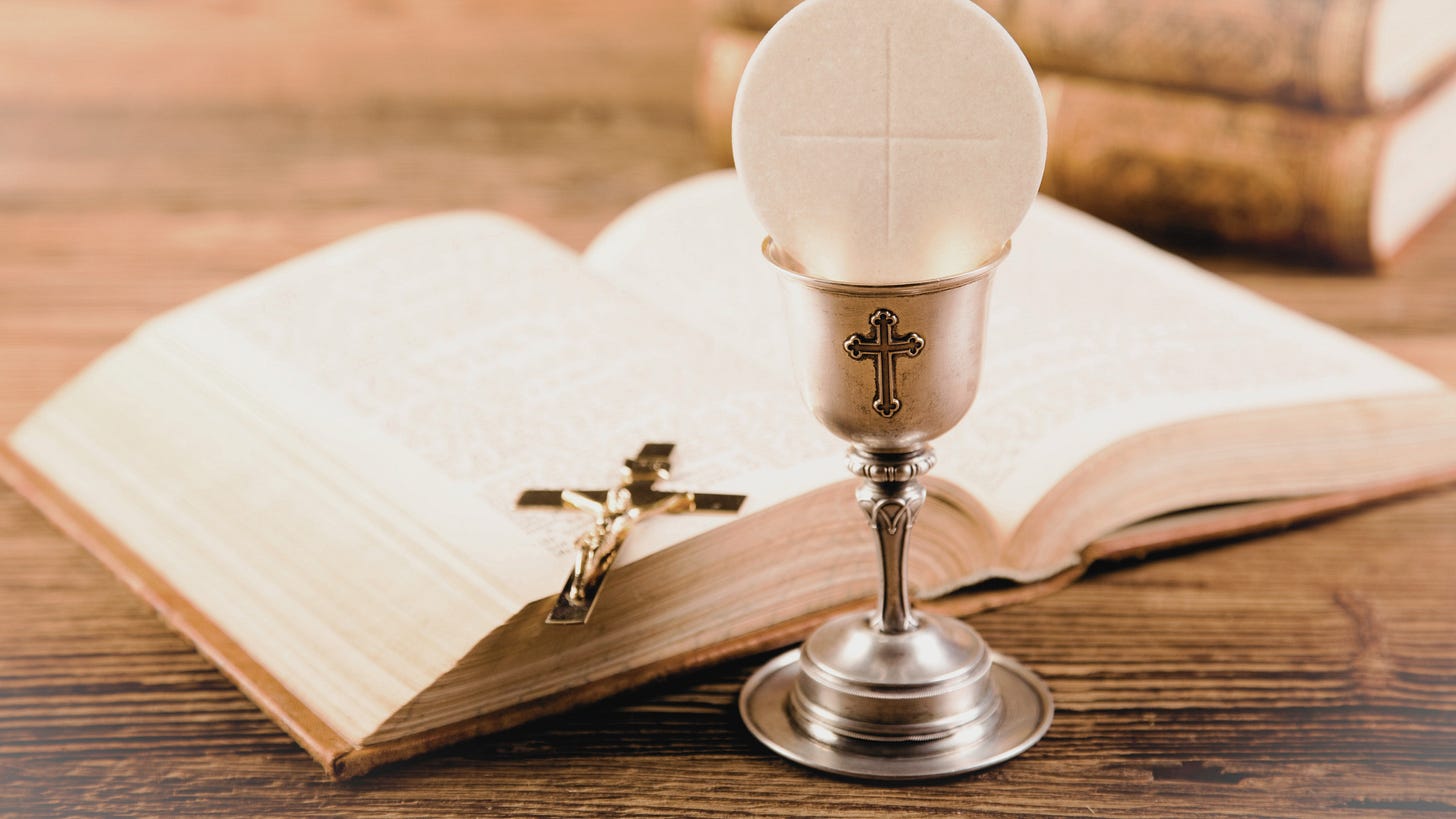As I was thinking about the various debates on the Eucharist, I was struck by the fact that most of them center on the nature of Christ’s presence. Is the substance of the bread and wine changed? Is Christ in, with, and under the bread and wine? Is he present by way of signification only? Is he sacramentally present at all?
While I in no way want to undermine the importance of these kinds of discussions, I think at times they distract from the real issue; not how Christ is present, but that Christ is present. More on this in a moment.
Being an Anglican, I have seen the practical implications of the various articulations of Christ’s presence firsthand: From treating the bread and wine as truly God, to treating it as nothing more than bread and wine. From adoration and the reservation of that which remains in a tabernacle, to not sweating the crumbs that fall to the floor, wrapping the remains in plastic wrap to be tossed into the freezer for later use.
In both examples, the presiders claimed to believe that Christ’s body and blood are truly present and truly received in the Supper, but because the way in which this happens is approached so differently, it leads to irreconcilable conflict regarding how one is to handle the elements of the Eucharist.
Now, it may seem like I am returning to the issue of how Christ is present. This really is the lynchpin regarding how the elements are handled, right? Kind of. In many ways, how Christ is present is the determining factor regarding the treatment of the elements. However, in this short piece, I am not interested in teasing out the various articulations of Christ’s presence and arguing for the one I think is best. Instead, I think some of our differences can be resolved by simply returning to the common ground (and common confession) between catholics that Christ is present.
Since all catholic Christians confess that Christ is present in the Supper, I want to make the case that in light of this confession, our treatment of the Eucharistic elements should always err on the side of more rather than less reverence and veneration. My reasoning is threefold:
The in-house disagreements regarding the mode of Christ’s presence center on philosophical and theological theories.
Because they are theories, we do not have any epistemic certainty regarding who is correct.
Because we do not have certainty regarding who is correct, we must err on the side of our confession “that Christ is present” and honor the bread and wine accordingly.
My conclusion rests on the fact that the Eucharist is a mystery of faith. I think we sometimes forget this. As Western Christians especially, we tend towards a brutal dissection of things until nothing remains hidden from our intellects. In something as profound as the Eucharist, there is truly no sufficient explanation for the miracle that occurs. No matter how many theories we propose, at the end of the day, we see bread and wine and are told (by Christ) that they are his body and blood. No one can explain this mystery, and because of that, I believe that regardless of low or high churchmanship, when it comes to the Eucharist, we must treat the elements with great reverence.
If God says that bread is his body and wine is his blood, why would we treat those elements as common bread and wine? This really does not make sense to me. The only argument I have heard against a higher reverence towards the elements has to do with the fear of idolatry. However, I find this argument strange. For those who are worried about committing idolatry by worshipping bread, I must remind you as clearly as I can that no one has ever bowed down to bread. Any catholic who has ever bowed before the sacrament does so with the belief that it is Christ. Thus, their worship is always Christ—the very opposite of idolatry. Even if, for the sake of argument, we determine that their understanding of Christ’s presence is wrong, and the bread is only a sign, the intent of their worship is correct and orthodox since it is directed towards Christ and not bread and wine.
However, if the Catholics are right, and Christ’s body is substantially present, I want to point out that the Reformed are guilty of treating the body of Christ as mere bread. It seems to me that this error is far more severe even though I grant it is not an unforgivable sin.
That being said, when it comes to me personally, I would much rather be guilty of bowing before bread, believing with sincerity that it is my Lord, than to be caught treating the very body of God as mere bread. Therefore, my proposal to all catholic minded Christians is this: treat the Blessed Sacrament of the Body and Blood of our Lord as just that: the very body and blood of Christ. This is the plain teaching of Scripture and this is the nature of mystery. If we step back from our confident assertions regarding the mode of Christ’s presence, instead embracing the sacrament as a mystery, I believe it will very quickly (and naturally) lead to a greater reverence towards the elements. As I see it, the one who errs on the side of reverence understands the nature of mystery.





